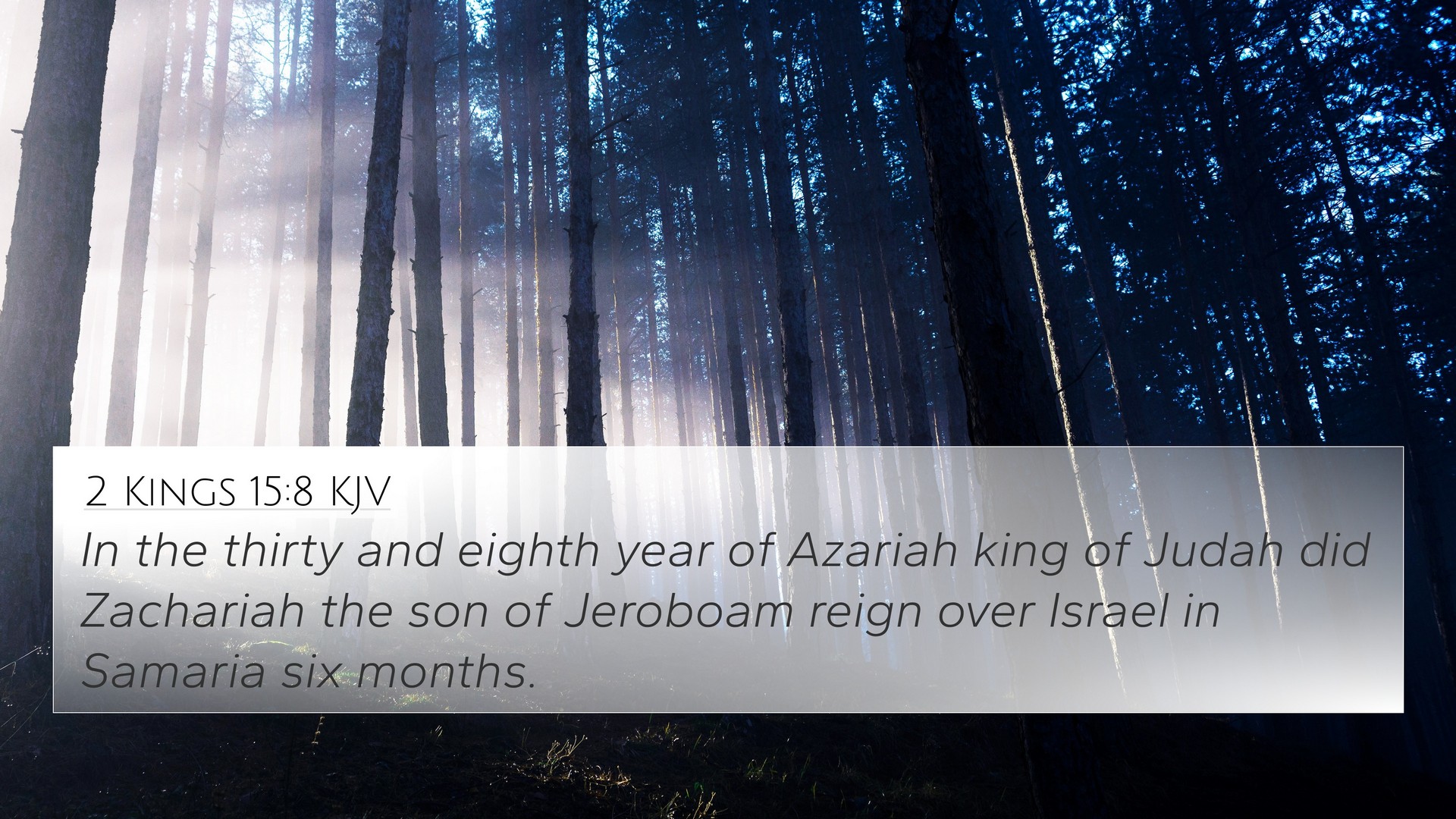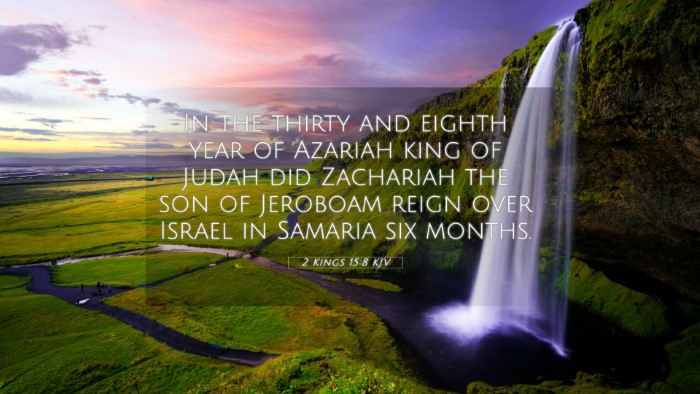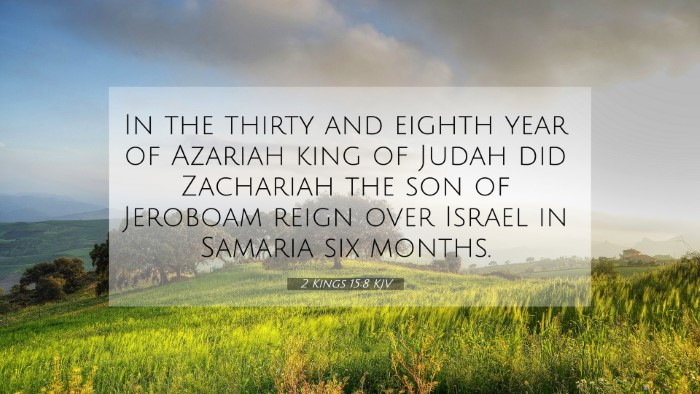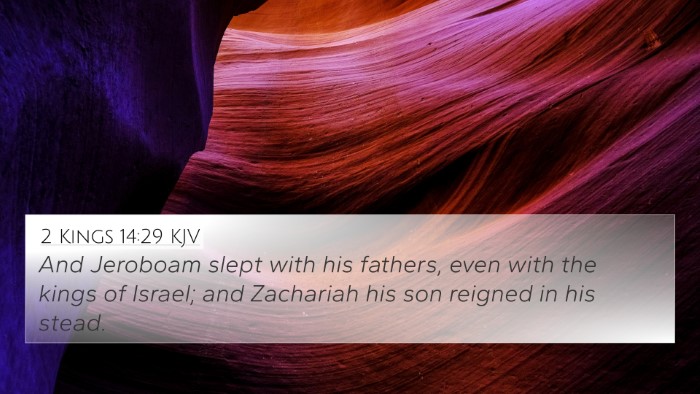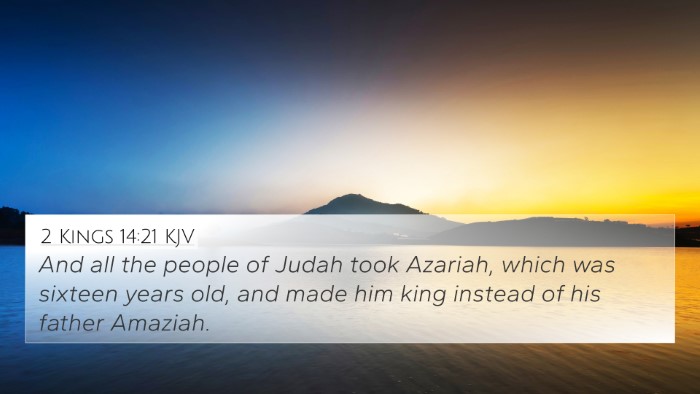Understanding 2 Kings 15:8
Verse: 2 Kings 15:8 - "In the thirty-eighth year of Azariah king of Judah, Zechariah the son of Jeroboam reigned over Israel in Samaria six months."
Contextual Overview
The Book of 2 Kings provides a historical account of the kings of Israel and Judah, focusing on their reigns, actions, and the overall spiritual state of the nations.
The verse in question introduces Zechariah, the son of Jeroboam, marking a significant moment in Israel's monarchy.
Combined Insights from Commentaries
Matthew Henry's Commentary
Matthew Henry emphasizes the brevity of Zechariah's reign, highlighting the instability of Israel's monarchy during this period. He notes that
Zechariah's reign lasted only six months, underscoring the recurring theme of brief and tumultuous reigns in Israel.
Henry interprets this brevity as a reflection of God's judgment upon Israel for its idolatry and moral corruption. He also points out that
Zechariah followed in the footsteps of his father Jeroboam, suggesting a continuation of sinful practices that ultimately led to his downfall.
Albert Barnes' Commentary
Albert Barnes provides additional insights into the significance of Zechariah's reign amidst the historical backdrop of Israel. He
discusses the political turmoil during this era, including the lack of stability due to civil strife and external threats.
Barnes suggests that Zechariah's reign, although short, represents God's patience and mercy, allowing for a continuation of the Davidic line
even through unworthy heirs. He connects Zechariah's reign to the overarching theme of divine sovereignty, where God permits certain outcomes
while progressively revealing His divine plan.
Adam Clarke's Commentary
Adam Clarke delves into the implications of Zechariah as being the last of the house of Jehu to sit on the throne of Israel. He
explores the significance of Zechariah's genealogy and link to former kings. Clarke interprets Zechariah's short reign as a
culmination of a series of prophetic warnings that went unheeded by the people. He provides a theological reflection on the
importance of monarchy in Israel, drawing connections between their societal structure, moral failing, and the resulting divine
judgment experienced by the nation.
Thematic Connections and Cross-References
This verse can be understood more deeply through comparative Bible verse analysis and cross-referencing with related scriptures.
Here is an exploration of key connections:
- 2 Kings 14:23-29: Provides context about Jeroboam II's reign, emphasizing past military successes and the spiritual decline.
- Amos 7:9: Highlights prophetic judgments against the house of Jeroboam, complementing the narrative of Zechariah's downfall.
- Hosea 1:1: Introduces the prophetic voice during the time of Israel's kingdom, echoing themes of idolatry and judgment.
- 2 Kings 10:30-31: God's promise to Jehu that his descendants will reign, which includes Zechariah as a continuation but leads to judgment.
- 2 Chronicles 26:16-21: Discusses the life of Azariah, providing parallel insights into God's expectations for kingship and judgment.
- Micah 1:1: Sets the scene during a time of political turmoil and divine prophecy, illustrating the interconnectedness of leaders and their morality.
- Jeremiah 22:10-12: Focuses on the judgment against the lineage of kings that neglect God's commands, relating to Zechariah's fate.
Significance in Biblical Narrative
Zechariah's short reign serves as a stark reminder of the consequences of turning away from God.
It illustrates the biblical principle that leadership carries immense responsibility and that the spiritual state of the nation is
directly linked to its rulers. The emphasis on cross-references allows for a deeper understanding of the themes of accountability,
judgment, and the prophetic tradition within the biblical narrative.
Conclusion
In summary, 2 Kings 15:8 encapsulates a significant moment in Israel's troubled history, epitomizing the cyclical nature of
rebellion against God and its repercussions through the lens of Zechariah's fleeting reign. This verse encourages readers to
engage in cross-referencing biblical texts to uncover the rich theological implications of leadership and divine justice.
